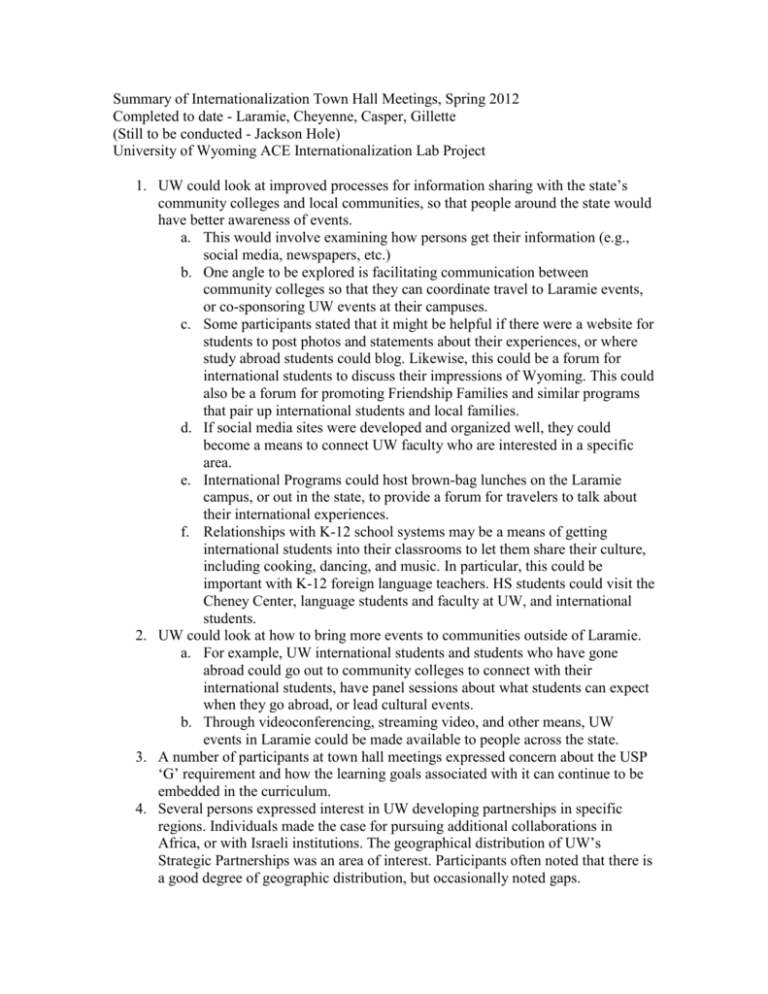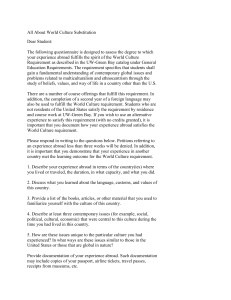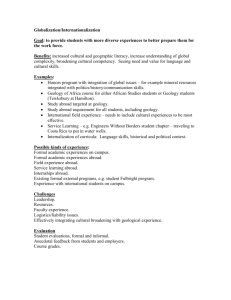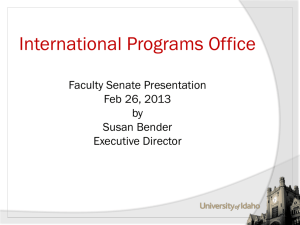Summary of Internationalization Town Hall Meetings, Spring 2012
advertisement

Summary of Internationalization Town Hall Meetings, Spring 2012 Completed to date - Laramie, Cheyenne, Casper, Gillette (Still to be conducted - Jackson Hole) University of Wyoming ACE Internationalization Lab Project 1. UW could look at improved processes for information sharing with the state’s community colleges and local communities, so that people around the state would have better awareness of events. a. This would involve examining how persons get their information (e.g., social media, newspapers, etc.) b. One angle to be explored is facilitating communication between community colleges so that they can coordinate travel to Laramie events, or co-sponsoring UW events at their campuses. c. Some participants stated that it might be helpful if there were a website for students to post photos and statements about their experiences, or where study abroad students could blog. Likewise, this could be a forum for international students to discuss their impressions of Wyoming. This could also be a forum for promoting Friendship Families and similar programs that pair up international students and local families. d. If social media sites were developed and organized well, they could become a means to connect UW faculty who are interested in a specific area. e. International Programs could host brown-bag lunches on the Laramie campus, or out in the state, to provide a forum for travelers to talk about their international experiences. f. Relationships with K-12 school systems may be a means of getting international students into their classrooms to let them share their culture, including cooking, dancing, and music. In particular, this could be important with K-12 foreign language teachers. HS students could visit the Cheney Center, language students and faculty at UW, and international students. 2. UW could look at how to bring more events to communities outside of Laramie. a. For example, UW international students and students who have gone abroad could go out to community colleges to connect with their international students, have panel sessions about what students can expect when they go abroad, or lead cultural events. b. Through videoconferencing, streaming video, and other means, UW events in Laramie could be made available to people across the state. 3. A number of participants at town hall meetings expressed concern about the USP ‘G’ requirement and how the learning goals associated with it can continue to be embedded in the curriculum. 4. Several persons expressed interest in UW developing partnerships in specific regions. Individuals made the case for pursuing additional collaborations in Africa, or with Israeli institutions. The geographical distribution of UW’s Strategic Partnerships was an area of interest. Participants often noted that there is a good degree of geographic distribution, but occasionally noted gaps. 5. Several participants expressed interest in the degree of support offered to international students. Questions were raised about the effectiveness of UW’s English language support for students. One suggestion is that UW offer a ‘Foundation’ term for international students prior to their actual admission and relocation to the state, perhaps through an online system. This ‘course’ could also cover informal and logistical issues, such as transportation, local health programs they can access, laundry, and how larger markets in Denver have foods and other items from home cultures that can help ease their transition. International students could be directed to the Laramie HS Driver’s Ed program for assistance (though there may be insurance and other concerns to navigate). 6. Returning study abroad students are a valuable resource for the institution, but also it could be useful to take steps to ensure effective learning by them. a. UW could explore creating a credit-bearing course for returning study abroad students, perhaps all of them or simply those who received Cheney funds, that would assign UW students to incoming international students, documenting or reflecting on their interactions and what they learn from assisting international students with their transition to UW and Wyoming. b. Students who have returned from study abroad, especially those at the master’s level, could serve as ‘peer advisors’ for IPO. They could then help prepare students for study abroad and assist international students arriving at UW. This could be done through a competitive application process. c. IPO could put together an “expertise bank” of students returning from study abroad, as well as including faculty and knowledgeable community members in that bank. 7. Several colleagues who work at community colleges expressed interest in deepening the CC-UW partnership, especially in international programs. a. UW could explore expanding its MOU’s with partner institutions so that community college faculty and students could participate in exchanges and study abroad opportunities. b. UW’s IPO has a depth of expertise that the state’s community colleges understandably cannot match. IPO could explore ways to share this knowledge and thus help the state’s community colleges more effectively use their resources. 8. A common theme was the economic dimension of UW’s international efforts. a. There is a need to educate employers about the value of study abroad for their employees (or perhaps future employees). IPO could participate in panels at forums such as the Wyoming Workforce Summit to promote this. b. UW could explore how to support Wyoming businesses that are interested in exporting and engaging in international markets. c. It would be good to show members of the state government the benefits of study abroad, and faculty and student exchanges. 9. Another theme, although this one was less frequent, concerned the level of resources available to IPO. a. Several persons stated that it would be helpful if students pursuing study abroad could receive larger scholarships. b. It would also be helpful if IPO had a full-time grants person.








